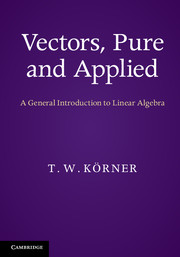13 - Vector spaces without distances
Published online by Cambridge University Press: 05 January 2013
Summary
A little philosophy
There are at least two ways that the notion of a finite dimensional vector space over ℝ or ℂ can be generalised. The first is that of the analyst who considers infinite dimensional spaces. The second is that of the algebraist who considers finite dimensional vector spaces over more general objects than ℝ or ℂ.
It appears that infinite dimensional vector spaces are not very interesting unless we add additional structure. This additional structure is provided by the notion of distance or metric. It is natural for analysts to invoke metric considerations when talking about finite dimensional spaces, since they expect to invoke metric considerations when talking about infinite dimensional spaces.
It is also natural for numerical analysts to talk about distances, since they need to measure the errors in their computations, and for physicists to talk about distances, since they need to measure the results of their experiments.
Algebraists dislike mixing up concepts in this way. They point out that many results in vector space theory from Desargues’ theorem (see Exercise 13.4.9) to determinants do not depend on the existence of a distance and that it is likely that the most perspicacious way of viewing these results will not involve this extraneous notion. They will also point out that many generalisations of the idea of vector spaces (including the ones considered in this chapter) produce structures which do not support a linked metric.
Information
- Type
- Chapter
- Information
- Vectors, Pure and AppliedA General Introduction to Linear Algebra, pp. 329 - 343Publisher: Cambridge University PressPrint publication year: 2012
